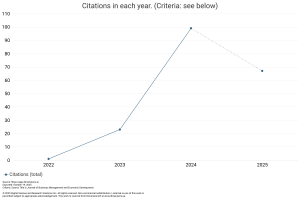Effect of Work Life Balance on Employee Performance through Job Satisfaction as an Intervening Variable
DOI:
https://doi.org/10.59653/jbmed.v3i02.1727Keywords:
Work Life Balance, Job Satisfaction, Employee performance, PLS-SEM, EmployeeAbstract
This study's backdrop is the state of workers who are doing worse, supposedly as a result of a work-life imbalance that affects their level of job satisfaction. The purpose of this study is to evaluate and assess how work-life balance affects employee performance at PT Mitra Grafika Perdana, using job satisfaction as an intervening variable. The Partial Least Squares-Structural Equation Modeling (PLS-SEM) analysis tool, which is processed using SmartPLS 4.0 software, is utilized in this quantitative research methodology. 52 employees made up the overall sample size, which was obtained by employing the saturated sampling approach, which involves sampling the entire population. Questionnaires, observations, interviews, and documentation studies were used to gather data. The findings demonstrated that:"(1) Work-Life Balance has a positive and significant effect on Employee Performance;"(2) Work-Life Balance has a positive and significant effect on Job Satisfaction;"(3) Job Satisfaction has a significant effect on Employee Performance; and (4) Job Satisfaction can mediate the effect of Work-Life Balance on Employee Performance. “Thus, a good Work-Life Balance will increase Job Satisfaction, which has an impact on improving Employee Performance."
Downloads
References
Abd-Elrahman, A.-E. ., Kamel, M. ., & Said, S. . (2025). Measuring and managing organizational performance based on organizational capitals, service quality and BSC performance outcomes. Management Research Review, 48(1), 121–145. https://orcid.org/0000-0003-3710-8528
Afandi, P. (2021). Manajemen Sumber Daya Manusia (Teori, Konsep dan Indikator) (Cetakan 2). Zanafa Publishing.
Asari, A. F. (2022). Pengaruh Work-Life Balance Terhadap Kinerja Karyawan Melalui Kepuasan Kerja Pada Karyawan BPJS Ketenagakerjaan. Jurnal Ilmu Manajemen, 10(3), 843–893.
Astuti, D., Prahiawan, W., & Imron, A. (2025). Effect of perceived organizational support and intrinsic motivation on employee performance with organizational citizenship behavior as an intervening variable at the regional financial and asset management agency of serang city. Journal of Production, Operations Management and Economics, 01. https://doi.org/10.55529/jpome.51.93.104
Dalila, A., & Hadi, H. K. (2024). Pengaruh work-life balance terhadap job performance dengan job satisfaction sebagai variabel intervening. Jurnal Ilmu Manajemen, 12, 524–536.
Goswami, I., & Dsilva, N. R. (2019). Impact of job satisfaction and job stress on employees’ life in Mumbai’s hospitality sector: An empirical study using SEM. Journal of Strategy and Management, 12(3), 330–346. https://doi.org/10.1108/JSMA-01-2019-0012
Greenhaus, J. H., Allen, T. D., & Foley, S. (2004). Work-Family Balance: Exploration Of A Concept.
Hadi, A. A., Sullaida, & Nurmala. (2018). The Relationship of Job Satisfaction,Transformational Leadership, and Work Discipline on Performance Employee With Organizational Commitment As Intervening Variable of Administration Staffs At State Malikussaleh University. Indonesian Journal of Educational Review, 5(1), 52–67.
Harbi, M. (2020). Influence of Work Life Balance on Performance of Employees in Jordan Hospitals. International Journal of Research -GRANTHAALAYAH, 8(1), 53–58. https://doi.org/10.29121/granthaalayah.v8.i1.2020.247
Ingsih, K., Budiantoro, R. A., Hasanatina, F. H., & Ali, S. (2022). Work-life Balance and Compensation on Performance with Job Satisfaction as an Intervening Variable for Millennial Generation Banking Employees. Jurnal Manajemen Bisnis, 13(2), 255–276. https://doi.org/10.18196/mb.v13i2.13947
Isa, M., & Indrayati, N. (2023). The Role of Work-life Balance as Mediation on the Effect of Work-Family on Employee Performance. SA Journal of Human Resource Management, 21, 1–10. https://doi.
Neza, C., & Rivai, H. A. (2020). Pengaruh Pelatihan Terhadap Kinerja Dengan Motivasi Kerja Sebagai Variabel Mediasi Pada Karyawan Pt. X. Journal of Management and Business Review, 17(1), 1–25. https://doi.org/10.34149/jmbr.v17i1.169
Pawirosumarto, S., Sarjana, P. K., & Gunawan, R. (2017). The effect of work environment, leadership style, and organizational culture towards job satisfaction and its implication towards employee performance in Parador hotels and resorts, Indonesia. International Journal of Law and Management, 59(6), 1337–1358. https://doi.org/10.1108/IJLMA-10-2016-0085
Pratiwi, J. A., & Fatoni, F. (2024). Pengaruh Employee Engagement Dan Work-Life Balance Terhadap Kepuasan Kerja Karyawan. Jurnal Kewirausahaan Dan Inovasi, 2(4), 1004–1015. https://doi.org/10.21776/jki.2023.02.4.06
Rachman, M. M. (2021). The Impact of Work Stress and the Work Environment in the Organization: How Job Satisfaction Affects Employee Performance? Journal of Human Resource, 09(02), 339–354. https://doi.org/10.4236/jhrss.2021.92021
Rahmadani, M. G., Puspita, V., & Waliamin, J. (2023). Pengaruh Burnout dan Work Life Balance terhadap Kinerja Pegawai Inspektorat Provinsi Bengkulu. Jurnal Manajemen Bisnis Dan Keuangan, 4(1), 97–107. https://doi.org/10.51805/jmbk.v4i1.121
Robbins, S. (2016). Perilaku Organisasi (Edisi 20). Salemba Empat.
Rochim, S. (2019). Pengaruh Kemampuan, Work Life Balance, Kepuasan Kerja Terhadap Kinerja Karyawan Pada Karyawan BMT Permata Jawa Timur. Yos Soedarso Economics Journal, Volume 1(April), 20–28.
Saifullah, F. (2020). Pengaruh Work-Life Balance dan Flexible Work Arrangement Terhadap Kinerja Karyawati Muslimah Konveksi. BISNIS : Jurnal Bisnis Dan Manajemen Islam, 8(1), 29. https://doi.org/10.21043/bisnis.v8i1.6762
Sholihin, M., & Ratmono, D. (2021). Analisis SEM-PLS Dengan WarpPLS 7.0: Untuk Hubungan Nonlinier Dalam Penelitian Sosial Dan Bisnis. In Penerbit Andi.
Steven, H., & Prasetio, A. P. (2020). Pengaruh Stres Kerja Dan Kepuasan Kerja Terhadap Kinerja Karyawan. Jurnal Penelitian Ipteks, 5(3), 248–253.
Sutrisno, H. (2015). Metodologi Research. In Jurnal Ilmu Administrasi Bisnis. Yayasan Penerbitan Fakultas Psikologi UGM.
Tobiin, M. Z., Suyoto, Purnadi, & Haryanto, T. (2024). The Influence of Transformational Leadership Style, Work-life Balance, and Employee Engagement on Employee Performance at SL Corp Indonesia. Asian Journal of Economics, Business and Accounting, 24(8), 158–167. https://doi.org/10.9734/ajeba/2024/v24i81448
Wang, J., Qiao, L., Zhu, G., Di, K., & Zhang, X. (2025). Research on the driving factors and impact mechanisms of green new quality productive forces in high-tech retail enterprises under China’s Dual Carbon Goals. Journal of Retailing and Consumer Services, 82(104092). https://www.sciencedirect.com/science/article/abs/pii/S0969698924003886
Windika Putri, S., & Frianto, A. (2023). Pengaruh Work Life Balance Terhadap Kinerja Karyawan Melalui Komitmen Organisasi. Jurnal Ilmu Manajemen, 11(2), 293–305.
Wulandari, M., & Hadi, H. (2021). Peran Job Satisfaction sebagai Variabel Intervening antara Work Life Balance terhadap Employee Performance. Jurnal Ilmu Manajemen, 9(2), 816. https://doi.org/10.26740/jim.v9n2.p816-829
Zerlina, A., & Budiono. (2024). Pengaruh work overload dan work-life balance terhadap job performance melalui job stress pada karyawan. Jurnal Ilmu Manajemen, 12(2), 243–258.
Downloads
Published
How to Cite
Issue
Section
License
Copyright (c) 2025 Shelma Najwa Thalia, Eloh Bahiroh, Ali Imron Zarkasyi, Amiruddin, Asro bin Harun

This work is licensed under a Creative Commons Attribution-ShareAlike 4.0 International License.
Authors who publish with this journal agree to the following terms:
- Authors retain copyright and grant the journal right of first publication with the work simultaneously licensed under a Creative Commons Attribution-ShareAlike that allows others to share the work with an acknowledgement of the work's authorship and initial publication in this journal.
- Authors are able to enter into separate, additional contractual arrangements for the non-exclusive distribution of the journal's published version of the work (e.g., post it to an institutional repository or publish it in a book), with an acknowledgement of its initial publication in this journal.
- Authors are permitted and encouraged to post their work online (e.g., in institutional repositories or on their website) prior to and during the submission process, as it can lead to productive exchanges, as well as earlier and greater citation of published work (See The Effect of Open Access).





























